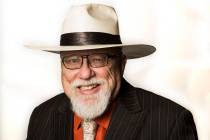Alzheimer’s has way of stealing moments
When she gave her husband a huge bear hug and told him how much she loved him, a breath escaped from his lips.
She wrapped his fingers around hers.
He was still so warm, his touch so tender.
"Are you sure he's still not with us?" Jean Georges recalls asking a nearby medical attendant through her tears.
A little more than a half-hour before, early on the morning of Nov. 26, she had received a phone call informing her that the love of her life, her husband of 58 years, 82-year-old Leonard Georges, had died.
She quickly drove from her Las Vegas home to the Prestige Assisted Living Center in Henderson, where her husband had lived for three years with Alzheimer's.
Caregivers told her they had gotten him ready for breakfast and were beginning to take him out of his room when he looked like he might faint. He was placed in his recliner, where he took a breath and died.
"It was unexpected," said a distraught Jean Georges, who found herself checking for her husband's pulse despite what she had been told. "I wanted to be there at the end, holding his hand, telling him I would miss him more than any words I know."
That last opportunity to say goodbye to a loved one who has had a long battle with a disease is what most of us hope for. Those scenes play out in hospitals every day, with family members from across the country rushing to a relative's bedside. Alzheimer's -- the horrific disease that kills brain cells -- often has a way of keeping that from happening.
What may occur, according to Susan Hirsch, director of social services at the Cleveland Clinic Lou Ruvo Center for Brain Health, is that those who suffer from Alzheimer's can't explain how an underlying physical condition may be worsening.
And then the end can seemingly come out of nowhere, even though there has been a protracted engagement with an incurable illness -- Alzheimer's affects some 8 million people today, and that number is expected to double by 2050.
Even as she deals with her grief, Georges, who volunteers at the Ruvo Center, wants to share what she's learned about Alzheimer's, which she now believes her husband showed signs of as early as 2003.
She said she had no idea what the disease was eight years ago and often ended up in arguments with her husband, the man who had told her every day how much he loved her, who made a career of turning around troubled businesses.
Inexplicably, the father of her three children began to accuse her of failing to write letters that he had never asked her to write, began to repeatedly ask her the same questions.
When she told doctors that her husband's behavior had changed -- he also was getting lost and didn't want to bathe -- they essentially told her it was just a normal part of aging.
If the Ruvo Center had been in town then, she's sure his Alzheimer's would have been diagnosed earlier, and she could have gotten into a caregiver support program.
As it was, she ended up with a stress-induced heart attack and doctors told her if she wanted to live she could no longer care for her husband
"The most difficult thing I have ever had to do is put my husband in a home," the 79-year-old widow said.
Ignorance about Alzheimer's definitely isn't bliss, she said.
"Had I known earlier he had Alzheimer's, I would have never argued with my husband," she said. "I've learned at the Ruvo Center that's a golden rule for caregivers. His reality was different than mine through no fault of his own. I regret those years of arguing so much. I don't think I would have had my heart attack and he could have lived with it longer if I had known what was happening wasn't his fault."
Instead of getting irritated by constant questions about something, she said she would have known to change the subject -- ask her husband, for example, if he remembered a concert they both enjoyed. In other words, distract, never argue.
"If I had known what to do earlier, we would have laughed so much more, like we did on Thanksgiving," she said. "I had no idea what he was saying during dinner, but it made sense, was even joyous, because we were together."
Paul Harasim is the medical reporter for the Las Vegas Review-Journal. His column appears Mondays. Harasim can be reached at pharasim@reviewjournal.com or 702-387-2908.

















